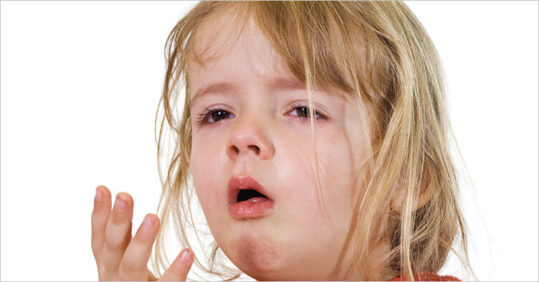Mythbuster: ‘I’m worried my child’s cough is causing her harm’

Parents continue to bring their coughing children to the practice, often repeatedly, even though every visit results in the same advice: ‘This is viral. Over-the-counter medicines may or may not manage symptoms, and there is no need for treatment with antibiotics.’
Parents’ concerns
Various studies have looked at parental beliefs on cough and other ‘minor’ childhood illnesses – although it could be argued that we can only call them minor in retrospect. As far back as 1993, a study carried out interviews with 30 mothers who had taken their children to a GP due to a cough.1 When the recordings were reviewed, it was found that the mothers were concerned about the effects of the cough itself, not just the underlying condition. There were concerns that the child would choke on their phlegm or vomit, or might die from an asthma attack or cot death.
Particularly worrying for parents was a night-time cough, both because of disturbed sleep and the worry the child might die in the night. There was a common belief that a cough ‘on the chest’ was damaging and needed antibiotics to break up the phlegm – we now know this isn’t the case.
A more recent study in Australia carried out interviews in GP waiting rooms and elicited a variety of worries from the parents of coughing children.2 Personal or family experiences were important, with some parents citing serious illness in their other children as heightening their fears, or concerns regarding things they had read about, such as a child who had inhaled a foreign body. This probably sounds familiar to many clinicians, as our own thought process might change in the aftermath of the diagnosis, or missed diagnosis, of a rare disease, or after we have attended a study session focusing on a condition and then seem to see it every week.
Related Article: Diagnosis Connect service will link people to advice from charities
Some parents were concerned about symptoms alone, such as pain in the chest associated with a cough, and others cited the internet as worsening their fears.
Reassurance from a clinician was seen as important, which we should bear in mind. Not every parent wants antibiotics for their child’s cough; many simply want to be reassured they can safely manage it at home.
Finding the best approach
So, what is the reality? Do we need to suppress a cough, or should we focus solely on the underlying diagnosis? In most cases, a cough is an appropriate response to a short-term viral illness and not in itself harmful. It is a reflex, in response to a stimulus such as dust, pollen or infection, and can help to clear the airway. It can be useful to explain this to parents, possibly backed up by easily available video resources,3 so they understand that in the vast majority of cases the important thing is any underlying condition, rather than the cough itself.
If that condition is a viral respiratory tract infection, then supportive care is all that is needed, with perhaps the addition of a salbutamol inhaler for the group of children who wheeze when they have a cold.
Serious causes
Some coughs are inherently dangerous, the most obvious example being whooping cough (pertussis) in a baby. Pertussis is a highly infectious disease that causes a prolonged cough (it is known in some countries as the ‘100-day cough’). Antibiotics within 21 days of the start may improve prognosis, but otherwise management for most cases is symptomatic. A significant exception is for children in the first six months of life who should always be admitted for monitoring, as there is a risk of apnoea and a mortality rate of 3.5% (compared with 0.03% in the general population).4
A chronic cough in a child, particularly at night, may point to a new diagnosis of asthma and very rarely can be a presentation of a more serious condition such as heart failure secondary to undiagnosed congenital heart disease, cystic fibrosis or primary ciliary dyskinesia. In particular, a continuous ‘wet’ cough that does not settle between apparent viral infections should raise your antenna for possible serious disease.
Related Article: CVD prevention must be national health priority, says report
Reassure and empower
In summary, a cough is not usually in itself a serious symptom. The important thing is to know the underlying condition – usually a self-limiting viral infection. Most children (and adults) don’t need antibiotics, and OTC cough medicines aren’t usually useful. Viral causes including bronchiolitis are extremely common (a third of all children will have bronchiolitis in the first year of life)5 and for the group with asthma, good management with appropriate use of an inhaler is likely to be more useful than antibiotics.
Many parents will be reassured by an assessment and explanation of why antibiotics are not needed. Your time doing this may be well spent – indeed, the psychotherapist Michael Balint suggested the concept of ‘the doctor [or nurse] as the drug’ in the 1950s.6 Not only will you spare the child unnecessary antibiotics now, but you might empower the parent to manage future respiratory tract infections at home.
Dr Toni Hazel is a GP in north London
Related Article: Postnatal contraception advice reduces the risk of back-to-back pregnancies
References
- Cornford C et al. Why do mothers consult when their children cough? Fam Pract 1993;10(2):193-6. Link
- Sharma M and Usherwood T. Up close – reasons why parents attend their general practitioner when their child is sick. Aust Fam Physician 2014;43(4):223-6. Link
- CoughPro.com. Blog: Why do we cough? 2020. Link
- NICE CKS. Whooping cough. London: NICE, 2022. Link
- NICE CKS. Cough – acute with chest signs in children. London: NICE, 2022. Link
- Kairys S. The doctor as drug, paternalism and apostolic function. New Jersey, US: Seton Hall University, 2018

See how our symptom tool can help you make better sense of patient presentations
Click here to search a symptom




